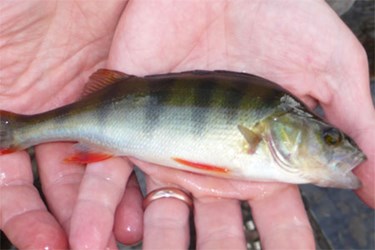Fish May Be Benefiting From Anti-Anxiety Drugs In Water

Drugs that seep into source waters are usually seen as an environmental threat, but could they actually be helping the fish?
A study published by researchers at Umeć University "showed that remnants of oxazepam, a drug used for anxiety, resulted in braver and more curious activity among normally timid fish. Individuals exposed to the drug examined their surroundings more freely than normally," the Helsinki Times recently recently reported.
Researchers found that exposing fish "aged between three-to-six days to oxazepam for 24 hours reduced the mortality rate of juvenile fish, when compared with the control group," the report said.
Why might fish benefit from anxiety reduction medications? "It remains unknown as to why psychoactive drugs reduce fish mortality. It is possible that since fish exposed to the drugs explore their surroundings more boldly, they find more nutrition, and thus they fare better," the Helsinki Times reported.
Pharmaceuticals that seep into the water supply are not known to harm people. According to the EPA, "studies have shown that pharmaceuticals are present in our nation's waterbodies. Further research suggests that certain drugs may cause ecological harm. The EPA is committed to investigating this topic and developing strategies to help protect the health of both the environment and the public. To date, scientists have found no evidence of adverse human health effects from PPCPs in the environment."
PPCPs are currently unregulated, but they are being tracked by the EPAs radar via the Third Contaminant Candidate List (CCL3) and the Unregulated Contaminant Monitoring Rule (UCMR). These are "precursors to possible regulatory action," Water Online previously reported.
Some researchers believe drugs that seep into the environment may have adverse effects on wildlife. Kathryn Arnold from the University of York is studying the effects of anti-depressants, including Prozac, on wildlife.
"To study the effects [drugs may] be having on starlings, Dr. Arnold and her team confined wild birds to aviaries and fed them on Prozac-laced worms, with the research to be published in October. They found that these birds ate less overall, snacking throughout the day instead of having full meals," BBC News recently reported.
"It's all these small, very subtle effects that build up and potentially compromise an animal in the wild," Arnold said in the report.
Image credit: "A perch in the hand," Tim Regan © 2007, used under an Attribution 2.0 Generic license: https://creativecommons.org/licenses/by/2.0/
http://www.wateronline.com/doc/fish-may-be-benefiting-from-anti-anxiety-drugs-in-water-0001